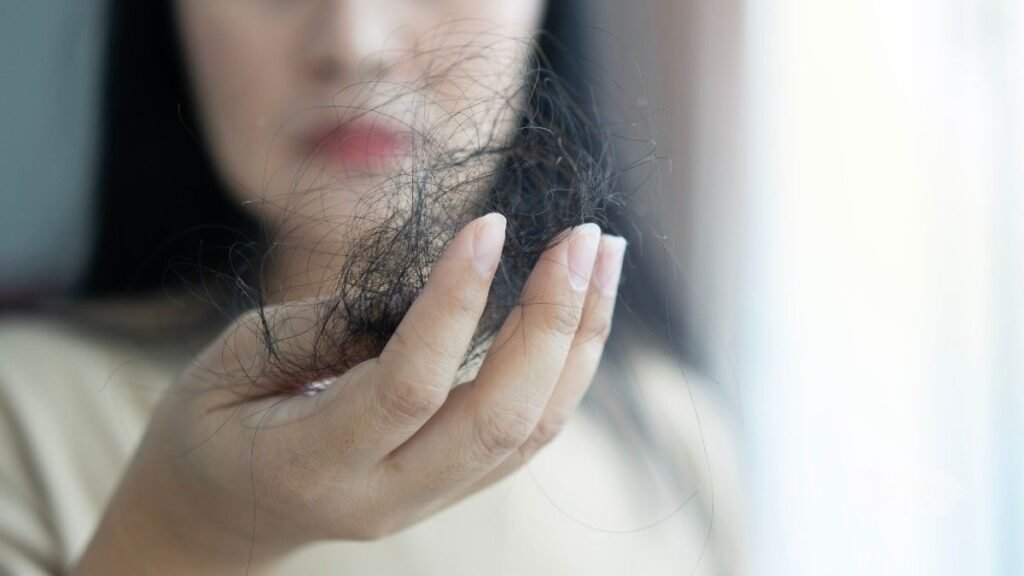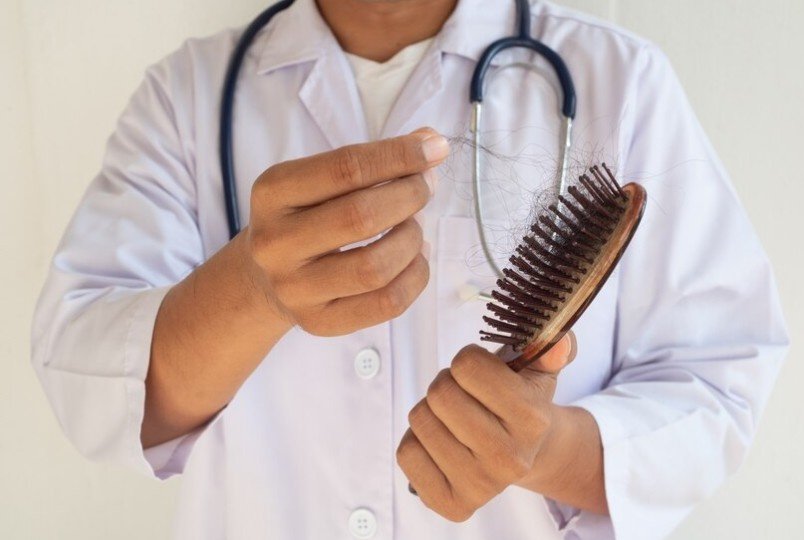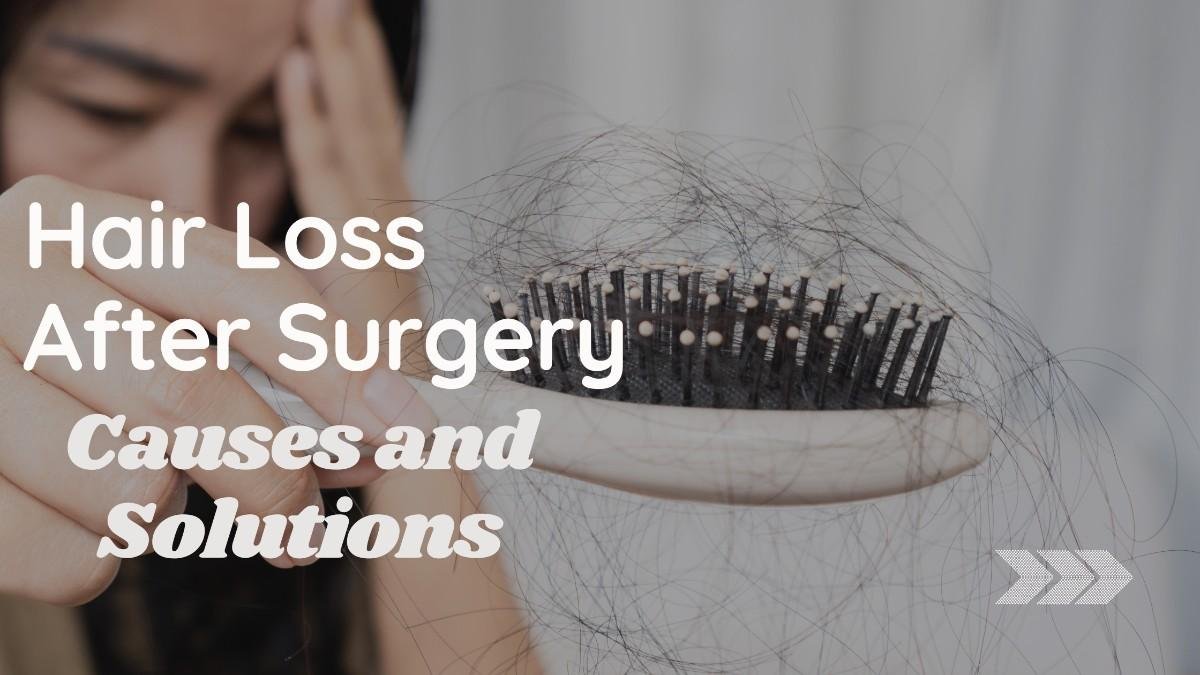Have you had surgery recently and noticed that there is more hair than normal on your pillow or in the shower drain? Even though it’s scary, hair loss after surgery is something that a lot of people go through. It’s natural to feel concerned but rest assured, there are reasons and treatments for this problem. This article will look at why people lose their hair after surgery and give you steps you can take to get your hair healthy and strong again.
Causes of Hair Loss After Surgery
There are several things that can cause hair loss after surgery. You can better control and avoid this situation if you know what causes it.
1. Telogen Effluvium
Telogen Effluvium (TE) is among the most common reasons for this issue. This disorder, a transient kind of hair loss, results in a lot of hair follicles entering the resting (telogen) phase concurrently causing more shedding.
Causes of Telogen Effluvium:
- Physical Stress: Surgery puts a lot of stress on the body, which may break up their usual growth cycle.
- Emotional Stress: TE can also be brought on by mental pain and anxiety connected to the surgery and rehabilitation procedure.
- Medication: Some drugs given during as well as after surgery might influence hair follicles, hence causing this issue.
2. Anesthesia
Hair loss after surgery can also be caused by the anesthesia used during surgery. Although the precise process is unknown, it is thought that anesthesia can momentarily alter the growth cycle, which would increase shedding.
3. Nutritional Deficiencies
When you’re recovering from surgery, you may need to make changes to your food and check for nutrient deficits, which can affect their health.
Common Deficiencies:
- Iron: Low iron can cause loss and thinning of the hair.
- Protein: Their development depends on enough proteins, consequently a shortage could lead to loss.
- Vitamins and Minerals: Vitamins like D and B, as well as minerals like zinc and selenium, are very important for their growth.
4. Hormonal Changes
Hormonal changes can happen after surgery, especially big operations, which may make hair loss worse. Thyroid hormone levels, for instance, might change and cause loss.

Solutions for Hair Loss After Surgery
Hair loss after surgery can be upsetting, but there are ways to deal with it and make it less of a problem. Here are some practical treatments:
1. Patience and Time
People usually only have Telogen Effluvium for a short time. Usually, their growth starts on its own six to nine months later. One should be patient and let your body heal on its own time.
2. Healthy Diet and Nutrition
Your hair’s health can be greatly improved by making sure your food is full of important nutrients. Emphasize a well-balanced diet comprising:
- Protein: For enough protein, include lean meats, fish, eggs, and lentils.
- Iron: Spinach, red meat, beans, and grains with added iron can all help raise iron levels.
- Vitamins and Minerals: To guarantee a great spectrum of vitamins and minerals, include a variety of fruits, vegetables, nuts, and seeds.
3. Stress Management
Stress reduction can assist in preventing loss. Think about including everyday relaxing strategies such as:
- Meditation: Frequent meditation aids in relaxation promotion and anxiety reduction.
- Exercise: Physical exercise helps to lower stress and enhance general well-being.
- Sleep: Make sure your body is recovering by getting enough sleep.
4. Gentle Hair Care
Maintaining excellent care of them helps stop more damage and encourages growth. Use these guidelines for moderate treatment:
- Avoid Harsh Treatments: Don’t use strong chemicals, heat styling, or tight haircuts that are known to damage.
- Use Mild Products: Choose free from sulfates and parabens mild shampoos and conditioners.
- Be Gentle When Brushing: Do not pull on them when you use a wide-tooth comb.
5. Supplements
Sometimes supplements enhance hair health and assist in solving nutritional deficiencies. Get advice from your doctor before taking any new vitamin supplements. Typical hair health supplements are:
- Biotin: Well-known for encouraging their strengthening and growth.
- Iron: If you don’t get enough iron, taking a supplement can help them stay healthy.
- Multivitamins: A complete multivitamin can help you be sure you are getting all the vital components.
6. Medical Treatments
If you keep losing them, you might want to look into surgical treatments. The choices consist in:
- Topical Treatments: One topical medicine that could encourage their growth is minoxidil, also known as Rogaine.
- Prescription Medications: Sometimes your doctor could recommend drugs to treat underlying diseases causing falls.
- Platelet-Rich Plasma (PRP) Therapy: This procedure stimulates their growth by infusing your Platelet-Rich Plasma into the scalp.

When to See a Doctor
Most of the time, hair loss after surgery is temporary, but there are times when you need to visit a doctor:
- Severe Hair Loss: See a doctor if you are losing lots of or finding hairless areas.
- Prolonged Hair Loss: If this issue lasts for more than a year, it could be a sign of a deeper problem that needs medical help.
- Symptoms of Nutritional Deficiencies: See a doctor if you run into weakness, tiredness, or other signs of nutritional deficiencies.
Concluding Words
Hair loss after surgery is normal and can be upsetting, but it usually only lasts for a short time. Knowing what causes this condition, like Telogen Effluvium, anesthesia, food deficiencies, and changes in hormones, can help you deal with it better.
These will recover and general health will be supported by a good diet, stress management, mild hair care, and, if needed, consideration of supplements or medical treatments. Remember, patience is essential; so, with the correct strategy, you will conquer this difficult phase and restore the vitality of your hair.
If hair loss lasts for a long time or is very bad, don’t be afraid to see a doctor to find out what’s wrong.


1 thought on “Hair Loss After Surgery: Causes and Solutions”
Comments are closed.